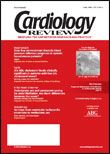A changing paradigm
Cardiology Review
This issue of marks a milestone in the journal's lifecycle, as I take the reins of the journal from Dr Peter F. Cohn, who founded the journal 24 years ago and has expertly navigated this publication, making it a useful tool for practicing clinicians. The journal owes much to Dr Cohn, and we express our deepest appreciation for his contributions.
Cardiology Review
Since its inception almost 25 years ago, much has changed regarding the dissemination of medical information. Medicine has rightfully joined the information highway, and many of today's physicians are more comfortable using electronic media and handheld devices to access medical information than relying on a paper copy of a journal. Mainstream medical media will need to adapt to this changing paradigm to keep up with the needs of contemporary physicians. recognizes the importance of providing readers with a multimedia platform, and we are working to create a more robust Web presence. Readers can already access
all of the articles on this website
, and we have expanded our offerings to include regular Web Exclusives. We will continue to strive to make the journal even more e-friendly to our readers.
Cardiology Review
This issue of includes articles discussing the sex- and age-related variations in the effect of diabetes in patients with heart failure, the effect of metformin treatment in persons at risk for diabetes, optimal anticoagulation in elderly patients with atrial fibrillation, and the effect of high lipoprotein(a) levels on the risk of myocardial infarction and ischemic heart disease. These articles reflect important clinical questions for practicing clinicians and were chosen for this attribute. The authors have aptly described their findings, and our editorial board members share their insights.
The fact that there are 2 articles on diabetes in this issue is a reflection of the important interrelationship between diabetes and cardiovascular diseases. The overall prevalence of diabetes, particularly type 2 diabetes, is increasing at a rapid rate. Furthermore, the age of diabetes onset has decreased, and type 2 diabetes has been reported in adolescents and children worldwide. Contributing factors for diabetes include an unhealthy diet, obesity, and a sedentary lifestyle. Because the incidence of diabetes among adolescents is steadily increasing in the United States, we need to ensure that our children exercise regularly, eat a wholesome diet, and develop healthy habits, all of which have been shown to attenuate the risk of diabetes mellitus. These same health measures benefit adults, and clinicians should encourage healthy habits in all of their patients.
On a positive note, we now have newer drugs that target the primary abnormality in diabetes. These include dipeptidyl peptidase-4 inhibitors or incretin mimetics, which inhibit the breakdown of the incretin hormone glucagon-like peptide-1, thereby stimulating the release of insulin from the pancreas and inhibiting glucose release from the liver in response to rising blood glucose levels. An important comorbidity in patients with diabetes is hypertension, and the US Preventive Services Task Force recently concluded that adults who have a sustained blood pressure greater than 135/80 mm Hg would benefit from diabetes screenings. Currently, it appears that the drugs that inhibit the renin angiotensin system may be the preferred therapy for blood pressure control in patients with diabetes. Several ongoing trials will help define the optimal therapeutic agent in the future.
Cardiology Review.
Finally, I would like to encourage you to write to us to share your insights, thoughts, and experiences on optimal glucose-lowering therapy in patients with diabetes mellitus and on your preferred antihypertensive therapy in these individuals. Your responses may be published in an upcoming reader's forum in the journal. On a broader level, I would love your feedback on how we can further improve the publication to make it more useful to your practice. My goal is for you to look forward to every issue of
—Debabrata Mukherjee
